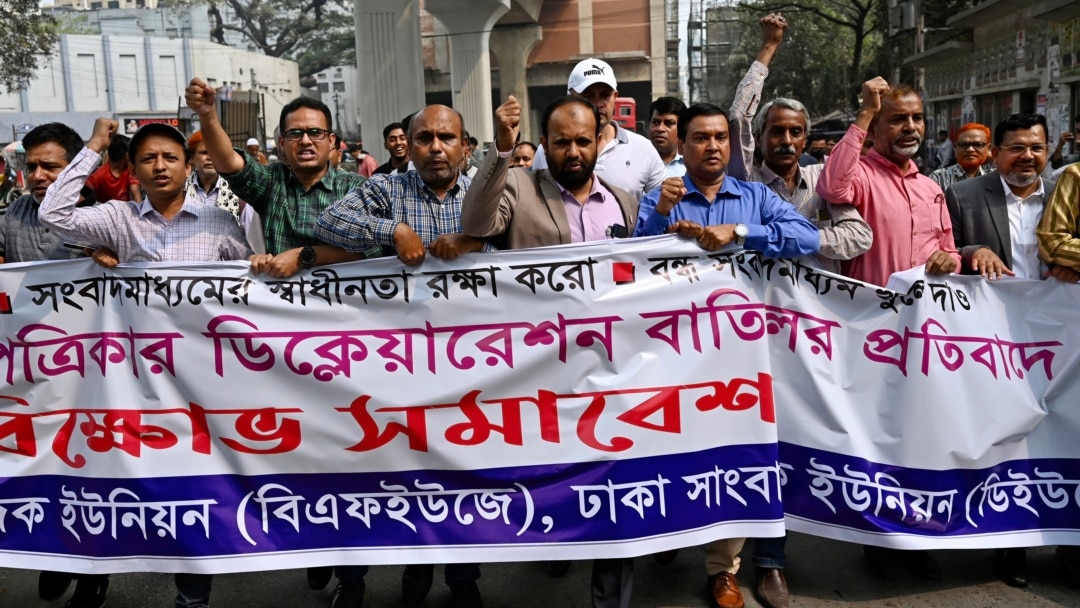
Journalists of the Dainik Dinkal publication hold a rally to protest against the government’s order to halt its production in Dhaka, Bangladesh, on Feb. 20, 2023.
by Zafar Iqbal Yousafzai 25 April 2023
Bangladesh, a country with a population of over 160 million people, has been facing an increasing number of human rights violations over the past few years. The regime of Prime Minister Hasina has been using state might against opposition parties, dissenting voices, and the media, while also misusing the Rapid Action Battalion (RAB) with impunity. This has led to an alarming increase in extrajudicial killings, torture, enforced disappearances, and other human rights violations.
According to human rights activists, the RAB has killed over 700 people since 2009, when the current government came to power. The RAB, which was formed as an anti-crime and anti-terrorism unit, has deviated from its given mandate by indulging in harassment, arrest, torture, killing, and dumping of dissenting voices. This has led to hundreds of politically active people affiliated with opposition parties being abducted in the run-up to the 2014 elections and never returning.
The government has been harnessing the RAB for political gains, with tacit approval from the highest offices of Prime Minister Shaikh Hasina Wajid. The RAB officers beat and waterboard victims, inviting journalists to record and report concocted stories like bootlegging and drug use by the victims.
Furthermore, the regime has been executing its victims in three stages. The execution site is selected off from prying eyes, and the target is captured and blindfolded late at night. The victim is then thrown into a civilian van that takes them to their final destination, where they are shot or left to bleed to death. Evidence is then manufactured to make it look like a shootout with a gang or a jihadi, and firearms are planted on the target.
In December 2021, the United States imposed sanctions on the RAB and a number of its top officers, including former chiefs of RAB. The US sanctions came in view of the HR violations that the RAB had indulged in. Furthermore, Bangladesh was not invited to the Biden administration’s two consecutive Democracy Summits (2022 & 2023) due to glaring HRVs, and Dhaka had expressed displeasure when the US State Department published the list of invitees to the democracy summit excluding Bangladesh.
Sequel to US sanctions, the Hasina regime is now persecuting following Bangladesh nationals by blaming them for spreading negativities against Bangladesh. For instance, former ambassador Osman Siddique has been accused of influencing US authorities to impose sanctions on RAB. He is being labeled as anti-state, and a defamation notice was served to him. Renowned economist and Nobel laureate Dr. Muhammad Yunus have also been accused of discouraging World Bank funding for the Padma Bridge Project and organizing anti-state campaigns, although he has not committed anything undesirable against the Hasina regime.
Additionally, the Hasina regime has been using the Draconian Digital Security Act (DSA) to stifle dissent and criticism of the government. According to a report by human rights group Ain o Salish Kendra, 2,249 cases were filed under the DSA over the course of the year before the Cyber Tribunals in Dhaka, Rajshahi, and Chittagong divisions alone.
Moreover, rape incidents have been on the rise, with HR group Ain o Salish Kendra estimating that there were records of at least 936 women and girls raped while 292 women were murdered by their husbands or other family members last year. Reports have also emerged regarding the death of indigenous rights activist Nabayan Chakma Milon in military custody.
Lastly, the mistreatment of Rohingya Muslims is another human rights concern in Bangladesh. Between December 2021 and April 2022, the government shut down and dismantled about 30 community-led schools. According to Rohingya refugees, some school teachers were beaten and arrested, while others were forced to flee. This has raised concerns about the government’s attitude towards the Rohingya community, who have faced widespread discrimination and violence in the country.
In conclusion, the situation in Bangladesh is grim, with human rights violations rampant and dissenting voices being silenced by the Hasina regime. The extrajudicial killings by RAB, the crackdown on social media, the mistreatment of Rohingya Muslims, and the rise in rape incidents are all concerning. The US sanctions on RAB officers and the exclusion of Bangladesh from the Democracy Summits serve as a warning to the Hasina regime. The international community must put pressure on the Bangladeshi government to respect human rights and ensure that those responsible for these violations are held accountable. As the UN High Commissioner for Human Rights stated, “The government has an obligation to ensure the protection of human rights, and those responsible for abuses must be held accountable.”
